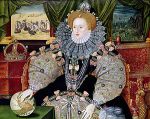For this post analysing the speech made by Elizabeth I at Tilbury in Essex before the Spanish Armada in 1588, I have used a copy taken from the British Library website (http://www.bl.uk/learning/timeline/item102878.html), which is also written below.
“My loving people,
We have been persuaded by some that are careful of our safety, to take heed how we commit our selves to armed multitudes, for fear of treachery; but I assure you I do not desire to live to distrust my faithful and loving people. Let tyrants fear. I have always so behaved myself that, under God, I have placed my chiefest strength and safeguard in the loyal hearts and good-will of my subjects; and therefore I am come amongst you, as you see, at this time, not for my recreation and disport, but being resolved, in the midst and heat of the battle, to live and die amongst you all; to lay down for my God, and for my kingdom, and my people, my honour and my blood, even in the dust.
I know I have the body but of a weak and feeble woman; but I have the heart and stomach of a king, and of a king of England too, and think foul scorn that Parma or Spain, or any prince of Europe, should dare to invade the borders of my realm: to which rather than any dishonour shall grow by me, I myself will take up arms, I myself will be your general, judge, and rewarder of every one of your virtues in the field.
I know already, for your forwardness you have deserved rewards and crowns; and We do assure you in the word of a prince, they shall be duly paid you. In the mean time, my lieutenant general shall be in my stead, than whom never prince commanded a more noble or worthy subject; not doubting but by your obedience to my general, by your concord in the camp, and your valour in the field, we shall shortly have a famous victory over those enemies of my God, of my kingdom, and of my people.”

Elizabeth I’s Tilbury speech was given at a time of great worry and upheaval for England (19 August 1588). Elizabeth I had signed the death warrant for Mary Queen of Scots the year before, and the Spanish used this as an excuse to invade, which they had wanted to do for a long time. Elizabeth was Protestant and Spain was a great Catholic country. The Spanish believed that, if they unseated Elizabeth from the English throne, then they could put a Catholic upon it and return England to Rome. Until 1587, this alternative to Elizabeth was Mary Queen of Scots.
The opening of the Tilbury speech “my loving people” suggests a relationship between Elizabeth and the people of England that is generally very positive. Elizabeth always knew about public image, and it seems that the people are very devoted to her. By implying their relationship to her, she makes them beholden to her. When Elizabeth talks of people being “careful of our safety” she is using the royal plural. Being the daughter of Anne Boleyn, and a committed Protestant, Elizabeth was an enemy of Spain, the foremost Catholic country in Europe. But because she had been declared illegitimate by her father, Henry VIII, when he executed her mother, many thought that she shouldn’t have been able to inherit the English throne. There had been several attempts to unseat her and replace her with Mary Queen of Scots.

Elizabeth goes on to say that she does not “desire to live to distrust my faithful and loving people”, meaning that Elizabeth trusts people to defend her, and defend England. She believes that her people really do love her and would lay down their lives for her. Elizabeth was probably also aware of the xenophobia that pervaded English society at this time, especially after Elizabeth’s half-sister, Mary’s, marriage to Philip II of Spain, which lost England Calais, their last possession in France. She encourages patriotism in order to persuade the people to protect her. This idea of protecting Elizabeth and England is carried on when Elizabeth says “I have placed my chiefest strength and safeguard in the loyal hearts and goodwill of my subjects”. This suggests that Elizabeth believes in the people, regardless of plots to replace her with Mary Queen of Scots. The ordinary people didn’t seem to take part in these plots. It seems that the people want a peaceful and prosperous time which Elizabeth can give them. They don’t have the same focus as the nobles.
Elizabeth, throughout the entire speech, tries to compare herself to the people. Regardless of her being anointed by God and placed above them, she still makes ongoing comparisons, especially when she says “live and die amongst you all”. She walks among her people before she speaks, making her a tangible presence, rather than a faraway head of church and state. Not just talking about life, but death as well, keeps Elizabeth close to the people because it reminds them that she is as mortal as they are. Similarly to this Elizabeth talks about “my honour and my blood”, talking about not just her physical person, but also her inner feelings and emotions. No doubt Elizabeth sees honour as her innermost core as a monarch, and so is willing to sacrifice herself, body and soul, to England, to protect her country and her people.

The most famous line of Elizabeth’s speech at Tilbury is “I know I have the body of a weak and feeble woman, but I have the heart and stomach of a king, and of a King of England, too”. There was a precedent for female monarchs who weren’t successful in England – Empress Matilda and Elizabeth’s sister, Mary I. Elizabeth was the first really successful female monarch. She acknowledges that her body may not be that of a king, but that she feels inside like a king. By differentiating between a king and a king of England, Elizabeth puts herself above the princes of Europe, but at the same time making the people of England feel superior to the people of Europe. Elizabeth breaks the mould of what a woman should be, and sets a precedent for female monarchs. Elizabeth acknowledges the lack of a king in England, but sees herself as both king and queen, and married to England and her people.
To end the paragraph, Elizabeth says that she will be “general, judge and rewarder of every one of your virtues in the field”. “General” suggests a leader, as Elizabeth already is, although she cannot actually fight alongside her troops. “Judge” isn’t just Elizabeth judging how well her troops perform, but also God judging the validity of Elizabeth’s rule and her condemnation of Mary Queen of Scots. “Rewarder” speaks for itself, in saying that Elizabeth will reward those who fight to protect her and England. At the beginning of the following paragraph, Elizabeth invokes the sacred “word of a prince” that rewards will come to those who defend England from the Spanish. The word of a prince was seen as binding.

Elizabeth then goes on to praise her lieutenant (Robert Dudley, Earl of Leicester) as a subject who couldn’t be “more noble or worthy”. It was well-known, particularly at the beginning of her reign, how close Elizabeth and Dudley were. It was suggested that they were planning to marry. However, the suspicious death of Dudley’s wife, Amy Robsart, put paid to those plans. Dudley later married Elizabeth’s second cousin, Lettice Knollys, the daughter of Elizabeth’s favourite, Katherine Knollys (nee Carey). The marriage was conducted without Elizabeth’s approval, but Dudley was forgiven and welcomed back to court. In Elizabeth’s absence it is made clear that the troops answer to Dudley.
The speech has a very strong ending, with Elizabeth declaring that “we shall shortly have a famous victory over those enemies of my God, of my kingdom, and of my people”. In saying “my God” Elizabeth implies a special connection, and separates the Church of England from the other Catholic and Protestant European states. Religion is at the heart of most conflicts in late 16th century Europe. When Elizabeth refers to enemies of “my Kingdom” she means those European princes (such as Philip II of Spain) who want to overthrow her and replace her with a Catholic alternative, or take England for themselves. Enemies of “my people” implies that Elizabeth stands shoulder to shoulder with her people. She defends them and they defend her. Both sides work for the good of England. It makes Elizabeth seem more real if she groups herself in with the people she rules.


This wasn’t very impartial. You seem to add a lot of emphasis on distinguishing countries as if there were good and bad countries, thing that in historical comments you should not do under any circumstance.
LikeLike
It’s a case of perception. The Tilbury speech is an English patriotic speech so naturally in the speech Spain is seen as the ‘enemy’. That doesn’t mean Spain was a bad country, but it’s the perception in the speech.
LikeLike
Excellent! Is the last paragraph your conclusion?
LikeLike
It is an analysis of the end of the speech, but in a way it’s my conclusion as well as Elizabeth’s, as her conclusion is the same as mine.
LikeLike
wow ur smart
LikeLike
Really good. Very detailed. It helped me a lot. Good job.
LikeLike
Thank you so much! I think this is one of my favourite posts I’ve written so far so that means a lot!
LikeLike
im doing an hw and im really confused about the question that was asked from me, which says, list the weak points of this speech, and this speech seems perfect, can there be any weak points
LikeLike
There are always weak points to any speech. I wouldn’t say it’s a weak point of the speech itself but Elizabeth gave the speech when she already knew the immediate crisis was over so it’s possible she might have said something different had England not been so successful and lucky at sea. She was a master orator it has to be said that she certainly knew how to make people sit up and pay attention! I think sometimes she exaggerates too much but it’s a matter of opinion and sometimes the weak points that you see might not be the same as the weak points other people see. It’s all a matter of perception.
LikeLike
Very impartial and effectual analysis.
LikeLike
Awesome analysis… really helped me. thanks
LikeLike